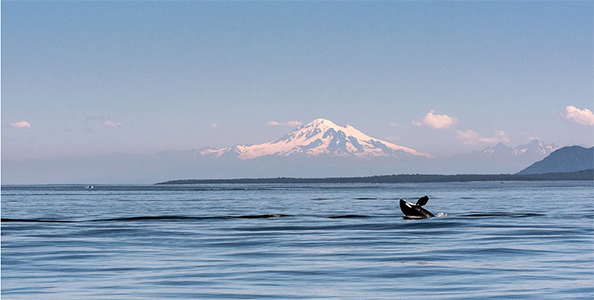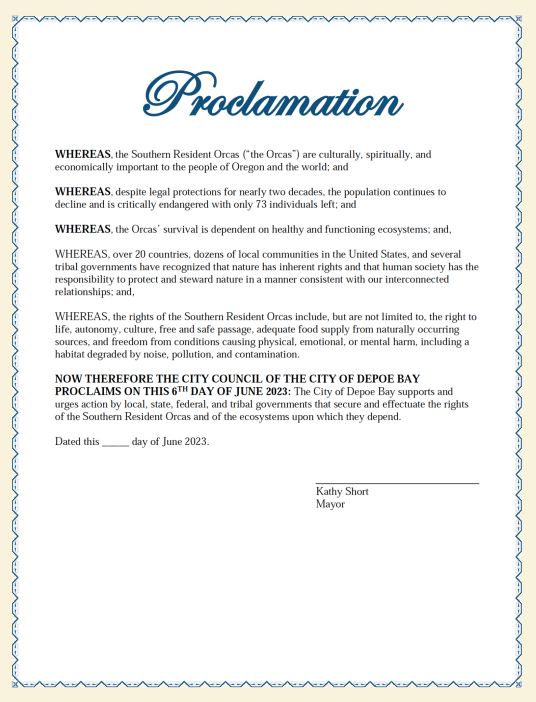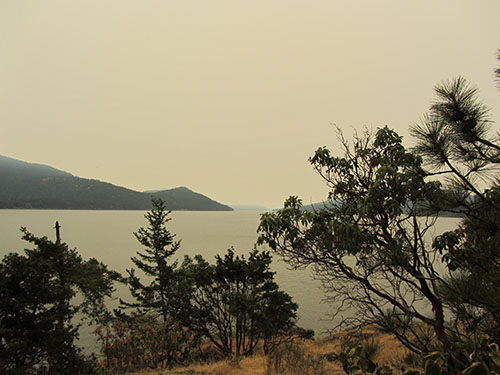||| FROM KRISS KEVORKIAN for LEGAL RIGHTS OF THE SALISH SEA |||
[On June 6], the Mayor and City Council Members of the City of Depoe Bay, OR, signed a proclamation describing the City of Depoe Bay’s support for action by local, state, federal and tribal governments that secure and effectuate the inherent rights of the Southern Resident Orcas. The City of Depoe Bay is the first city in Oregon to proclaim their support for the Southern Resident Orcas.
Their proclamation (included below) comes a few months after the Washington cities of Port Townsend, Gig Harbor, Langley, Bainbridge, and Des Moines made history by passing similar proclamations. Then Jefferson County passed their own proclamation in January 2023. San Juan County and Pierce County followed shortly thereafter.
“The proclamation really spelled it out that their food supply and habitat is in danger so we want to do all we can to help keep them safe. As the whale watching capital of the world, we value and love the Southern Resident Orcas.” Mayor Kathy Short, City of Depoe Bay, OR.
For the past five years, Earth Law Center and Legal Rights for the Salish Sea (a community group based in Gig Harbor, Washington), have built an advocacy campaign to catalyze a paradigm shift in society’s relationship with Southern Resident Orcas, including through recognition of their rights. “After working on and vetting a draft bill with multiple legislatures, we were asked to show that the constituents would support State level action recognizing and respecting the inherent rights of the Southern Residents. Though nonbinding, local proclamations and resolutions formally communicate community values, opinions or aspirations, and in this instance are serving as a form of stakeholder support for the campaign.” Michelle Bender, Ocean Campaigns Director at Earth Law Center.
Despite international, federal and state legal protections for nearly two decades, the population of the critically endangered Southern Resident Orcas has continued to decline, with only 73 individuals left in the wild. The Southern Resident Orcas are culturally, spiritually, and economically important to the people of the Pacific Northwest and the world, with their habitat
extending across State lines to Canada, Oregon and California. Groups in Oregon have also recently petitioned for the population to be listed under Oregon’s Endangered Species Act, recognizing they need more protection, and NOAA revised their critical habitat designation under the federal Endangered Species Act to include western U.S. coastal waters beyond the
Salish Sea.
“My colleagues in psychology and social work often suggest that we ‘go out in nature’ in order to improve our mental health and well-being. But my question to them is what are they doing to support the health and well-being of Nature and all her inhabitants? For me, being part of the rights of Nature movement has been invaluable because I’m taking action to help our planet. When it comes to grief and other mental health concerns, taking action contributes to our healing. Recognizing the inherent rights of the Southern Resident Orcas, who I focused my doctoral research on, is the beginning of our journey to a statewide bill,” notes Dr. Kriss Kevorkian, founder of Legal Rights for the Salish Sea (LRSS).
“The Ocean and seas are the foundation to all life and human wellbeing; providing the oxygen we breathe, sequestering carbon dioxide, regulating climate, and providing a primary source of food and livelihood for millions of people. Within such a broad expanse of space, it may seem like one ecosystem doesn’t matter, but it does. Over 8 million people live around the Salish Sea. The Southern Residents are keystone species and therefore indicators of ecosystem health. Therefore, if we protect them and their habitat, we protect ourselves and our rights including the human right to a healthy environment, clean water, food and to practice cultural life,” added Ms. Bender.
“The Southern Resident Orcas and Coastal Indigenous People have lived together in harmony since time immemorial. Their
devastating decline has been due mainly to human activity. It is our duty to correct our wrong doings and take responsibility for the decline of these beautiful orca and living waters in order to honor those that lived here before we did and to ensure a healthy ocean and ecosystem for all of us. I see this proclamation as a great first step toward that goal.” Rheama Koonce, Little Whale Cove, Depoe Bay resident, Board Member of Citizens for a Better Lincoln County.
“My initial attraction to Depoe Bay was its whales, especially the grays. And that began a lifelong study of them as individuals. My inspiration and love for whales can be attributed to my mentor Ken Balcomb who dedicated his whole life to trying to save the Southern Resident Orcas. This proclamation is a small way to honor his memory and the whales he loved.” Carrie Newell,
whale researcher and owner of Whale EcoExcursions.
Legal rights for species and their habitats is not new. Indigenous understandings of our kinship with other beings has existed for millenia. Hundreds of Rights of Nature laws exist in over 30 countries, with dozens at the local and tribal levels in the United States, including Santa Monica’s Sustainability Rights Ordinance and the Nez Perce’s resolution recognizing the rights
of the Snake River. Both San Francisco and Malibu passed resolutions in 2014 protecting the rights of whales and dolphins in their coastal waters.
This effort is also supported by an online change.org petition and declaration of understanding, that more than 10 organizations have signed onto. Earth Law Center created a toolkit to help advocates introduce a resolution or proclamation to their local communities, share the campaign on social media and helpful talking points. You can take action and view the toolkit here.
Earth Law Center (ELC) works to transform the law to recognize and protect nature’s inherent rights to exist, thrive and evolve. ELC partners with frontline indigenous people, communities and organizations to challenge the overarching legal and economic systems that reward environmental harm, and advance governance systems that maximize social and ecological well-being.
Legal Rights for the Salish Sea (LRSS) is a local community group based in Gig Harbor, WA, founded by Dr. Kriss Kevorkian, educating people to recognize the inherent rights of the Southern Resident Orcas. Under our current legal system humans and corporations have legal standing but animals and ecosystems don’t. We believe that animals and ecosystems should also have legal rights, not just protections that can be changed by different administrations.
City of Depoe Bay, OR, Proclamation supporting the rights of the Southern Resident Orcas








